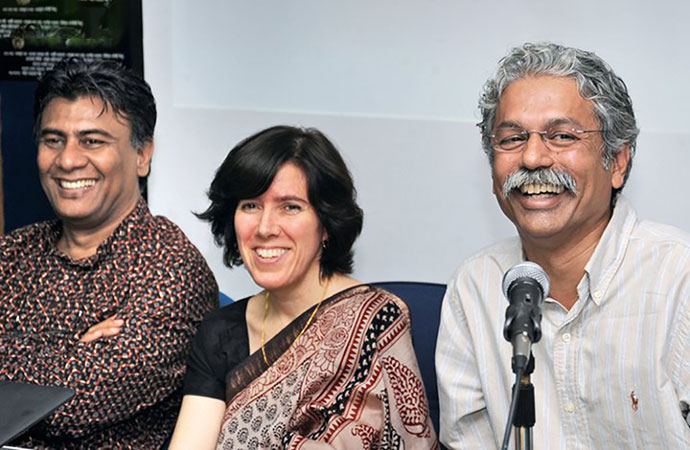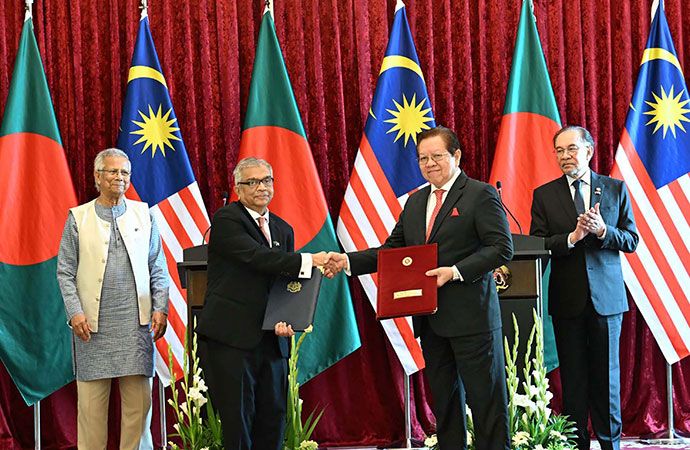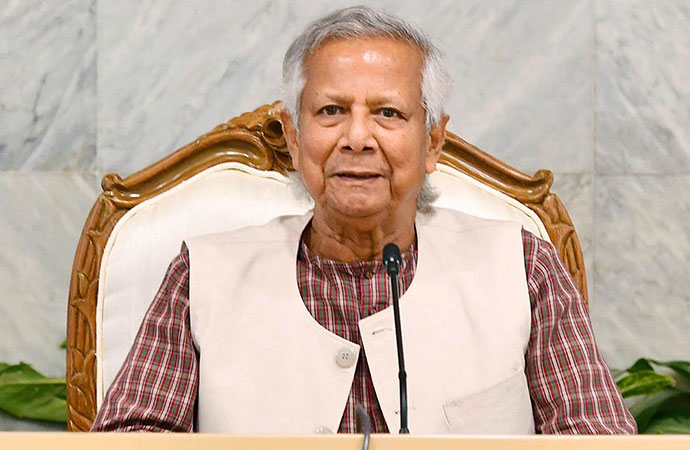Column

Tareque Masud , Catherine Masud and Ashfaque Munier. Photo: Collected
Fourteen years of losing Tareque Masud and Mishuk Munier
In August 2011, two of Bangladesh's iconic media figures - Tareque Masud and Ashfaque Munier were killed in a tragic road accident. Both men were working on the film Paper Flower which would have dealt with the Partition of India. Tareque Masud was Bangladesh's most celebrated independent film maker. Ashfaque Munier, who was commonly known as Mishuk Munier, was an international cinematographer, media specialist, broadcast journalist and the son of the martyred intellectual Munier Chowdhury.
The road crash which resulted in their deaths sparked nationwide concern over the increasing number of accidents on Bangladesh's highways. A case was lodged in the courts by Tareque Masud's American wife Catherine to demand compensation for their families. The High Court ruled in favor of Catherine Masud's claims in 2017. Increasing accidents led to a student movement for safer roads in 2018 which resulted in the enactment of the Road Transport Act to replace the Motor Vehicles Ordinance. But the new law controversially reduced the standard of liability for a driver who is responsible for causing a road accident.
Catherine Masud and her children have continued to pursue compensation claims. Represented by Sara Hossain, the case met with resistance from the previous government and bus owners who fear the prospect of increased financial liability under a stronger road safety regime. The wreckage of the vehicle which crashed is now preserved on the campus of Dhaka University.
At the time of the crash, Mishuk Munier was the chief executive officer (CEO) and chief editor of the satellite TV channel ATN News. Munier had previously co-founded The Real News Network in Baltimore with Paul Jay. His father's death during the genocide in 1971 profoundly shaped his worldview and drove his commitment to storytelling through the media. He worked at the Bangladesh National Museum, Dhaka University, the British Broadcasting Corporation, the Canadian Broadcasting Corporation, and Channel 4. He was a photojournalist and cameraman who was dispatched to conflict zones and areas hit by natural disasters.
As a cinematographer, Munier's documentary Dhaka Tokai won an award at the Oberhausen International Short Film Festival. Munier also worked on the documentary Return to Kandahar, which won a Canadian Emmy Gemini Award. Munier deployed his cinematographic skills to assist Tareque Masud in the production of Bangladesh's most acclaimed independent films.
Tareque Masud's debut film Adam Surat explored the life of the renowned painter S. M. Sultan. His autobiographical film Matir Moina (The Clay Bird) won the FIPRESCI Prize at the Cannes Film Festival and became Bangladesh's first Oscar submission. The film looked at underlying tensions between religious identity and secularism in rural Bangladeshi society. His film Ontarjatra looked at the Bangladeshi diaspora. His last film Runway tackled the issue of religious extremism. His wife Catherine played an instrumental role in editing and directing his films.
Tareque Masud was the founder of the Short Film Forum and organized the first International Documentary and Short Film Festival in Bangladesh in 1988. He was popularly known as the "Cinema Feriwalla" because he toured rural Bangladesh and hosted mobile screenings which made cinema accessible to rural Bangladeshis. Masud was a native of the Faridpur region.
Both men left a lasting impact on the cinema and journalism of Bangladesh. While Masud's films continue to resonate globally, Munier left an enduring legacy for broadcast media. Both men were posthumously awarded the Ekushey Padak in 2012. Their tragic demise was an irreparable loss to Bangladesh's liberal media landscape.
Umran Chowdhury is Assistant Editor of the Dhaka Courier and a Research Associate at the Cosmos Foundation and Bay of Bengal Institute.

























Leave a Comment
Recent Posts
Religion and Politics: A Toxic ...
At Dhaka University, cafeteria workers have been told not to wear shor ...
Enayetullah Khan joins AsiaNet ...
AsiaNet’s annual board meeting and forum was held in Singapore, ...
In a New York minute
Many leaders back a UN call to address challenges to ..
Defaulted loans at Non-Bank Financial Institutions ( ..
How the late Zubeen Garg embodied cultural affinitie ..